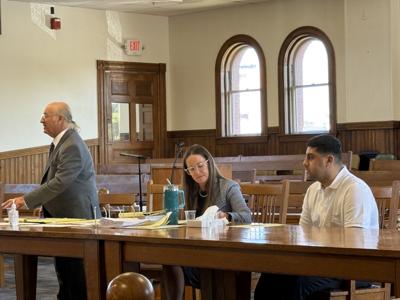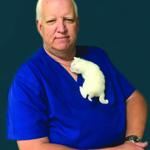LACONIA — Two more jurors were selected Wednesday morning in Belknap County Superior Court, where Hassan Sapry is set to stand for retrial on murder charges next week.
Sapry, 27, is accused in the 2019 killing of Wilfred Guzman Sr. His lawyers say they’ll be making the case he’s not guilty by reason of insanity. Sapry is represented by attorneys Mark Sisti and Amy Ashworth of Sisti Law Offices.
The State of New Hampshire, represented by prosecutors Jeffery Strelzin and Alexander Kellermann, will attempt to convince jurors Sapry is guilty of nine crimes, including first- and second-degree murder.
Indictments are allegations. Individuals are innocent until proven guilty.
Wednesday was the third day of jury selection in Sapry’s second trial — the first was ruled a mistrial by Belknap Superior Judge Elizabeth Leonard in 2022 — and the second day of voir dire, during which lawyers representing both parties question potential jurors one by one, opting to strike some out of contention while accepting others. They need to sit 12 jurors for trial.
Jurors will be required to determine whether the state and the defense met their respective burdens of proof. The state must prove beyond a reasonable doubt that Sapry committed the crimes. The defense must prove Sapry was insane at the time the crimes were committed, meeting the lesser burden of “by clear and convincing evidence.”
“We have to prove these elements, elements of those charges, beyond a reasonable doubt,” Strelzin told one potential juror.
In New Hampshire, according to state law, a person determined to be insane at the time they break the law is not criminally responsible for their conduct.
According to New Hampshire RSA 651:8-b, if a person is found not guilty by reason of insanity at the time of the offense charged, they must be “committed to a secure psychiatric unit until such time as he is eligible for release.”
It’s 12 residents of Belknap County who will be tasked with listening to arguments, reviewing evidence and ultimately coming to a decision over the next several weeks. Trial is scheduled to begin at 9:30 a.m. on Tuesday, Aug. 19.
And selecting those 12 individuals is no easy task. Between the judge, the prosecution and the defense, most of the jury pool is stricken from the list due to various circumstances.
“Can you guarantee Hassan you can give him a fair trial?” Sisti asked almost every potential juror.
On Wednesday, some of those excused from service on the jury received dismissal because of personal knowledge of the case, their previous experiences with members of Sapry’s family or any of the attorneys present, their apprehension regarding viewing or interacting with difficult or grotesque material, and other considerations not explicitly stated in open court.
Sisti described the materials which will be presented in court as “horrifying” while questioning a potential juror.
Two potential jurors who were among those present at the end of the day Monday, having answered "yes" to one or more of the questions included on juror questionnaires, for example, told the court they were related to individuals who were either victims of a crime in the past, or defendants in a criminal case. They indicated their past experiences could affect their ability to approach the facts of the case objectively.
Attorneys representing both sides appeared to agree their service wasn’t needed.
And a few potential jurors Monday told the court they were familiar with the details of the case, having followed reporting in newspapers and on television. Sisti asked one of them on Wednesday if they’d read recent reporting on the case, or if their knowledge came from reporting done in previous years, and they said they hadn’t read recent reporting.
Potential jurors are asked by the court not to consume news about the case while they’re in the jury pool, or while they’re sitting on the jury for trial. They’re also asked not to discuss the case or any related details with anyone, because doing so may prompt others to share their opinions, potentially degrading their ability to remain objective, as the defense and the state pursue their respective arguments.
Selected jurors appeared to have certain traits in common: a clear, definitive understanding of the importance of objectivity in such matters; an understanding of their own mindset and how it may or may not be affected by viewing objectionable materials, like photographs; and an ability to communicate their own open-mindedness.
“What we’re looking for is jurors who can be fair to both sides,” Strelzin said in court on Wednesday morning.


















(0) comments
Welcome to the discussion.
Log In
Keep it Clean. Please avoid obscene, vulgar, lewd, racist or sexually-oriented language.
PLEASE TURN OFF YOUR CAPS LOCK.
Don't Threaten. Threats of harming another person will not be tolerated.
Be Truthful. Don't knowingly lie about anyone or anything.
Be Nice. No racism, sexism or any sort of -ism that is degrading to another person.
Be Proactive. Use the 'Report' link on each comment to let us know of abusive posts.
Share with Us. We'd love to hear eyewitness accounts, the history behind an article.